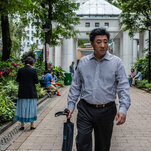
The Toll That Twitter’s Glitches Is Taking on Chinese Activists
These systems were once routinely monitored, with mistakes regularly addressed by staff. But a team that cleaned up spam and countered influence operations and had about 50 people at its peak, with about a third in Asia, was cut to single digits in recent layoffs and departures, two of the people said. The division head for the Asia-Pacific region, whose responsibilities include the Chinese activist accounts, was laid off in January. Twitter’s resources dedicated to supervising content moderation for Chinese-language posts have been drastically reduced, the people said.
- Glitches Pile Up: Twitter users around the world said that they could not post messages or send messages to one another on Feb. 8 — the latest in a series of technical issues.
- Child Abuse Content: After acquiring Twitter, Elon Musk vowed to rid the platform of child sexual abuse material. A review by The Times found that the imagery has persisted on the site.
- ‘A Giant Black Box’: Under its new owner, Twitter has done away with its press department. Here is what that has meant for the journalists writing about the company.
- Lawsuit: The advisory firm Innisfree M&A Incorporated sued Twitter in New York State Supreme Court, seeking about $1.9 million in what it says are unpaid bills after it advised the company on its sale to Elon Musk last year.
So when some Twitter systems recently failed to differentiate between a Chinese disinformation campaign and genuine accounts, that led to some accounts of Chinese activists and dissidents being difficult to find, the people said.
“It’s tough being a Twitter user nowadays,” said Jenn Takahashi, who runs the Twitter account @bestofdyingtwit, which has logged the platform’s shortcomings since Mr. Musk took the helm. She said she also has had difficulty seeing tweets from people she follows, with notifications “either delayed or sent twice,” and direct messages becoming cluttered with “so much spam.”
Twitter and Mr. Musk did not respond to requests for comment. In December, Mr. Musk acknowledged the visibility restrictions on some users and announced plans to improve Twitter’s transparency on the issue.
Non-English language moderation has been a particular challenge for American social media companies, which often do not have enough staff in those areas and rely on imperfect machine translations, said Gabriel Nicholas, a research fellow at the Center for Democracy & Technology who studies content moderation and disinformation on social media.
“If Twitter is making mistakes in Chinese-language Twitter, then it’s very possible that they’re making mistakes in other languages,” he said.
Twitter has long been banned in China. But it has been a gathering place in recent years for Chinese dissidents, human rights activists and overseas Chinese communities seeking to debate topics censored on the mainland.

